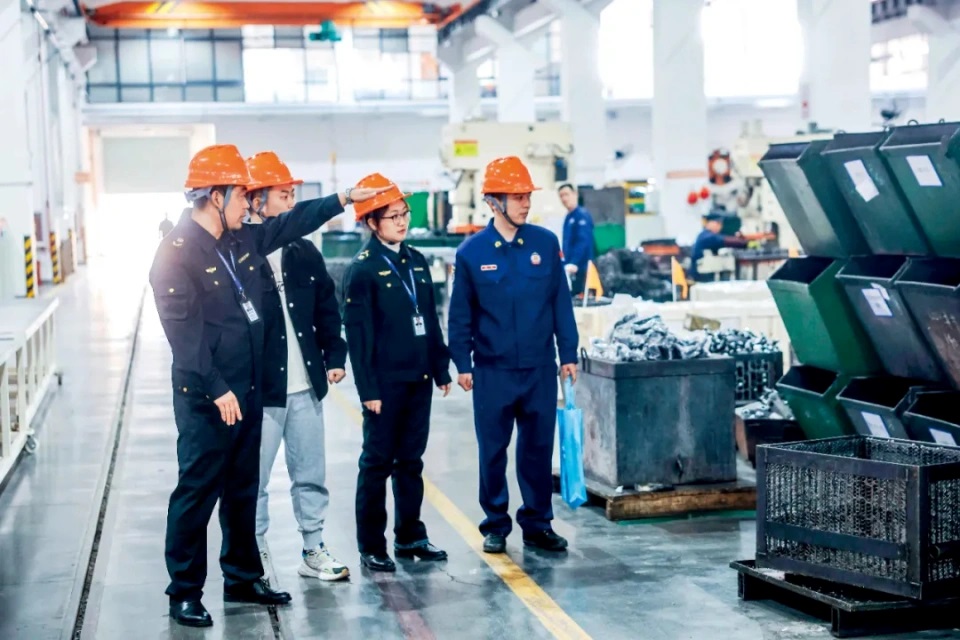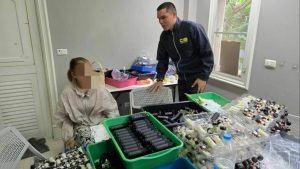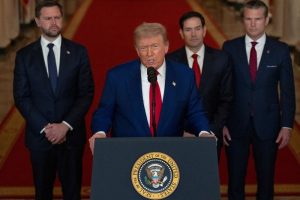If you don’t have money, find a way to fine

A farmer in Jiangsu sold uninspected mutton and made a profit of 180 yuan. The Market Supervision Bureau issued a fine of 100,000 yuan to him; a company in Shandong had to undergo hundreds of inspections every year from 2021 to 2023, and the company was exhausted… In recent years, the law enforcement chaos of some administrative departments has attracted widespread attention.
Since March, a special action to standardize administrative law enforcement involving enterprises has been launched nationwide. A relevant person in charge of the Ministry of Justice said that the special action focuses on correcting four types of prominent problems: one is the problem of random charges, random fines, random inspections, and random seizures; the second is illegal law enforcement in other places and profit-seeking law enforcement; the third is inconsistent law enforcement standards, inconsistent requirements, and behaviors that increase the burden on enterprises; the fourth is abuse of power, favoritism, failure to impose penalties, “taking bribes”, rough law enforcement and other violations of law enforcement norms.
Many provinces have also successively issued policy documents on strictly standardizing administrative inspections involving enterprises, and proposed specific measures on how to solve prominent problems in administrative inspections involving enterprises. According to China Newsweek, 20 provinces and cities, including Beijing, Shanghai, Zhejiang, Jiangsu, Hubei, Hunan, and Fujian, have issued policy documents.
Xue Jun, a professor at the Law School of Peking University, pointed out to China Newsweek that under the background of domestic economic pressure and complicated international environment, my country needs to create a good business environment for the development of private enterprises. The promotion of special actions by various regions and departments to standardize administrative law enforcement involving enterprises is an important part of the “combination punch” to optimize the business environment.
From tens of thousands of yuan to hundreds of thousands of yuan
Liu Chengtong is the general manager of a chemical company in an eastern province. He recalled that in the past few years, the company would be inspected by different administrative departments every month. When the frequency was high, there were even inspections every week. The inspection subjects involved multiple departments such as development and reform, production safety, and ecological environment, and they were usually inspected separately.
“Welcoming the inspection will take up a lot of energy for the company.” Liu Chengtong said that the company must do preparations before each inspection, and the person in charge of the company needs to accompany the inspection. If it is required to make rectifications after the inspection, it is also necessary to prepare various rectification materials. Because this series of work is very cumbersome, the company needs to assign several people to be responsible for welcoming the inspection.
Liu Chengtong even encountered administrative inspections with “penalty indicators”. “With fines as the main inspection purpose, enterprises generally cooperate passively.” The fines range from tens of thousands to hundreds of thousands.
Why are there so many administrative inspections? In a case of repeated administrative inspections involving enterprises announced by the Ministry of Justice, the Justice Bureau of a city in Shandong pointed out that the reasons for the large number of inspections are: first, the internal coordination mechanism of the department is not sound, the inspection lacks planning, the law enforcement approval system is not strict, and the linkage law enforcement mechanism between different sections of the same department is not sound; second, the law enforcement cooperation mechanism between departments is not smooth, the inspection lacks coordination, and the departments are not in touch with each other and fight each other; third, the inspection standards are not unified, and the superiors’ guidance and coordination are not strong enough, resulting in arbitrary and repeated law enforcement.
Ma Liang, a professor at the School of Government at Peking University, told China News Weekly that the fundamental reason for the chaos in law enforcement involving enterprises is the asymmetric relationship between government and business. “How to establish the legal market status of enterprises, give enterprises greater autonomy, and be able to say ‘no’ to illegal inspections and law enforcement without retaliation is a problem that needs special attention.”
In Xue Jun’s view, the main reason for the profit-seeking law enforcement is that some local governments are in financial difficulties. “If there is no money, they will find ways to impose fines and use the fines and confiscations to supplement fiscal funds.”
The phenomenon of abnormal growth in fines and confiscations in many places has attracted attention from all parties. According to data from the Ministry of Finance, the national non-tax revenue in 2024 will be 4473 billion yuan, an increase of 25.4% over the previous year.
Ma Liang believes that in recent years, the frequent chaos in enterprise-related law enforcement has seriously affected the business environment and the development of the private economy. It has reached a point where it needs to be highly valued and comprehensively rectified, so the central government will pay so much attention to and strengthen the standardization of enterprise-related law enforcement.
The Central Economic Work Conference held at the end of 2024 clearly proposed to carry out special actions to standardize enterprise-related law enforcement when deploying the key tasks of economic work in 2025. On January 3 this year, the General Office of the State Council issued the “Opinions on Strictly Standardizing Administrative Inspections Involving Enterprises” (hereinafter referred to as the “Opinions”), which is the first time that comprehensive and systematic regulations have been made on enterprise-related inspections at the national level.
It won’t just be a “gust of wind”
“After the government standardized the law enforcement inspections involving enterprises this year, the frequency of inspections has been significantly reduced, and basically no disturbance has been achieved.” Liu Chengtong said that recently, the frequency of enterprises accepting inspections from administrative departments has dropped to once every three months, and the process has become more standardized.
According to the “China News Weekly”, the measures to standardize administrative inspections involving enterprises in the policy documents issued by various provinces have commonalities and can basically be divided into three categories.
The first category is to clarify the inspection rules and establish inspection-related systems, including clarifying the administrative inspection subjects, clarifying the list of administrative inspection items, and publishing administrative inspection standards. The second category is to standardize the inspection methods and methods. For example, Zhejiang, Jiangsu and other places proposed to optimize the “comprehensive inspection once”, that is, to promote the merger and joint inspection. If the same administrative law enforcement subject implements multiple inspections on the same inspection object, in principle, they will be combined and carried out in sequence. The third category is to strengthen law enforcement supervision, including broadening supervision channels, regularly analyzing and reporting administrative law enforcement inspections, etc.
At a press conference held by the State Council Information Office on May 22, Hu Weilie, Vice Minister of the Ministry of Justice, revealed that standardizing administrative inspections involving enterprises has achieved significant results, and unnecessary inspections of enterprises in various places have been greatly reduced.
Hu Weilie gave an example, saying that from January to April this year, the total amount of administrative inspections in Beijing decreased by 72% year-on-year, and the number of off-site inspections increased by 48% year-on-year. Although the number of on-site inspections has decreased, the effect has improved, and the rate of problem discovery has increased by 26% year-on-year. In addition, the implementation rate of “comprehensive inspection once” in Zhejiang Province reached 33.9%, directly reducing the number of enterprise inspections by more than 10,000 times. Fujian Province used the repeated inspection warning function and issued a total of 9,998 repeated inspection warnings, and the total amount of administrative inspections decreased by 50.6% month-on-month. The number of visits to enterprises in Guangming District, Shenzhen City decreased by 65.84%.
In addition, the amount of administrative fines in various places has also decreased. According to the data of the Ministry of Justice, as of May 21, a total of 6,232 clues of problems in various regions and departments were collected, and 5,246 clues were supervised. The amount of money involved in the rectification of the problems was 335 million yuan, and the losses of 98.8135 million yuan were recovered for enterprises.
It is worth noting that the Ministry of Justice emphasized that the special action to standardize administrative law enforcement involving enterprises will not be just a “gust of wind”. On May 20, the Private Economy Promotion Law was officially implemented. Jiang Shan, director of the Second Legislative Bureau of the Ministry of Justice, said that the Private Economy Promotion Law further clarified the basic principles and legal requirements of enterprise-related law enforcement, providing strong institutional support and legal guarantee for further standardization of enterprise-related law enforcement this time and in the future.
Is the door on the top floor open or closed?
On May 22, the Ministry of Justice released the third batch of typical cases of administrative law enforcement supervision. Among them, the Hangzhou Municipal Bureau of Justice used artificial intelligence technology to supervise “inspection and disturbance of enterprises”. The case shows that in September 2024, the Hangzhou Municipal Bureau of Justice found through analysis of the data of the Zhejiang Provincial Administrative Law Enforcement Supervision Platform that a hotel was inspected many times by multiple administrative law enforcement departments from January to March 2024, which may involve the problem of “inspection and disturbance of enterprises”. The Hangzhou Municipal Bureau of Justice and the technology company jointly developed the “AI Administrative Law Enforcement Intelligent Follow-up Application” and contacted the hotel staff by telephone to understand the situation. After verification, the problem of “inspection and disturbance of enterprises” does exist.
Zhong Dingwen, director of the Legal Supervision Department (Business Environment Legal Department) of the Hangzhou Municipal Bureau of Justice, told China News Weekly that when the Hangzhou Municipal Bureau of Justice uses the AI administrative law enforcement intelligent follow-up application, it will automatically select enterprises that have received more than four administrative inspections within 90 days from the city’s key industries, and automatically implement telephone follow-up according to the set procedures and time periods. Zhong Dingwen said that in the above case, the intelligent application asked hotel staff questions such as “how many administrative inspections have been received this year” and “which departments will conduct administrative inspections”. Through the intelligent language model, it automatically collects, identifies and analyzes the feedback content, and intelligently compares the feedback with the inspection records of the administrative law enforcement supervision platform to determine whether the relevant issues can be used as clues to initiate administrative law enforcement supervision.
Since June 2024, the Hangzhou Municipal Bureau of Justice has used the AI administrative law enforcement intelligent follow-up application to follow up on more than 8,000 enterprises and has obtained more than 40 problem clues.
In the special action to promote the standardization of administrative law enforcement involving enterprises in various places, the inconsistency of law enforcement standards between different departments is a prominent problem.
A local judicial bureau held a symposium on the hotel industry in May to discuss the issue of “should the door on the top floor of the hotel be open or closed?” “The public security organs require it to be closed to prevent people from jumping off the building. The fire department requires it to be opened because the door on the top floor, as part of the fire safety passage, should be kept unobstructed.” An interviewee told China News Weekly that in the end, all parties reached a consensus that the door on the top floor of the hotel should be opened.
Ma Liang believes that in the future, it is necessary to continue to strengthen the standardization of administrative law enforcement inspections across the country to avoid multiple policies and each department acting on its own, which will also help reduce the abuse of discretion by law enforcement departments.
At the press conference on May 22, Hu Weilie pointed out that in response to the inconsistent law enforcement standards reflected in the implementation of the “Opinions”, the Ministry of Justice is working with the Ministry of Ecology and Environment, the Ministry of Emergency Management, the State Administration for Market Regulation, the National Fire Rescue Bureau and other relevant departments to step up research on solutions and countermeasures.
It is worth noting that standardizing administrative law enforcement involving enterprises requires finding a balance between “random law enforcement” and “no law enforcement”.
From the perspective of enterprises, Liu Chengtong believes that appropriate administrative inspections are very important for enterprises. “Just like if there are no exams, students may slack off. Sometimes administrative inspections can point out the problems of enterprises, which is actually necessary.” Liu Bo, director of the Administrative Law Enforcement Coordination and Supervision Bureau of the Ministry of Justice, said at a press conference on May 22 that standardized law enforcement does not mean that the more lenient the law enforcement, the better, nor does it mean that law enforcement should be strict when it should be strict, and lenient when it should be lenient. Taking Hangzhou as an example, Zhong Dingwen introduced that at present, many administrative law enforcement agencies in Hangzhou implement hierarchical, classified and graded supervision. If an enterprise has no illegal record within three years, the administrative agency may not come to inspect; if an enterprise has only one illegal record within three years, the administrative agency will conduct appropriate inspections; if an enterprise has more than two illegal records within three years, it may be subject to stricter supervision. How to establish a long-term mechanism and avoid rebound in standardized administrative law enforcement involving enterprises? Liu Bo said that the next step will be to speed up the formulation of the Administrative Law Enforcement Supervision Regulations. At present, the public solicitation of opinions has been completed, and it will be promoted as soon as possible. This regulation is an important institutional support for the all-round, full-process, normalized and long-term supervision of administrative law enforcement work, and it is also the top-level design of the administrative law enforcement supervision system. In addition, specific rules will be formulated in the future for outstanding law enforcement issues.
(At the request of the interviewee, Liu Cheng is a pseudonym in the article)
Published in the 1192th issue of China News Weekly magazine on June 23, 2025






